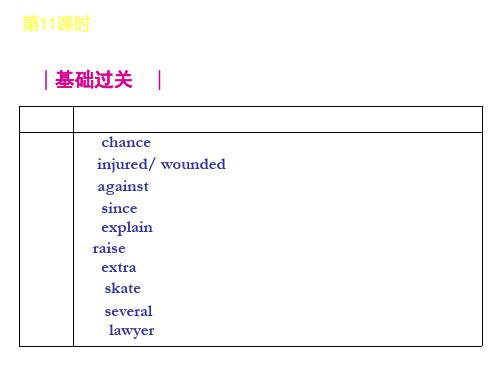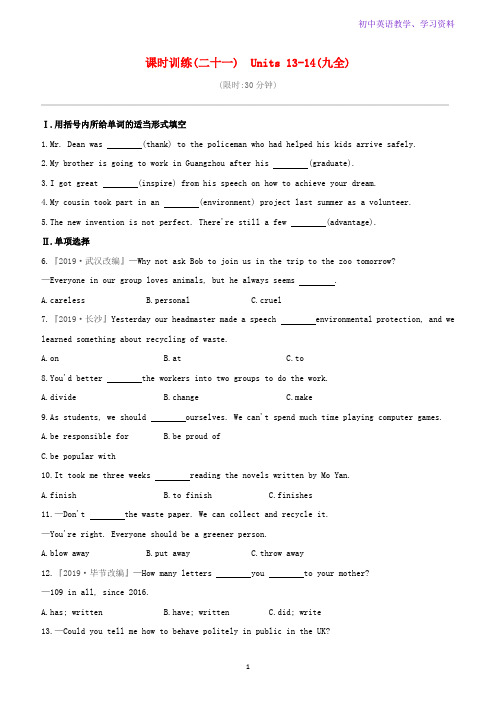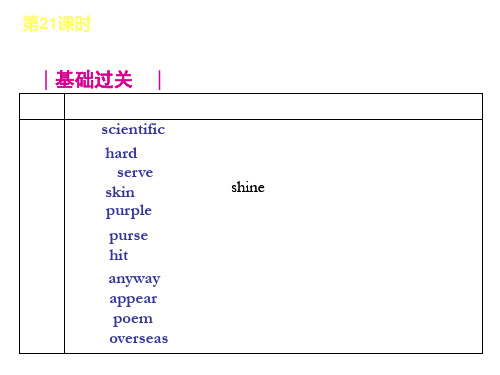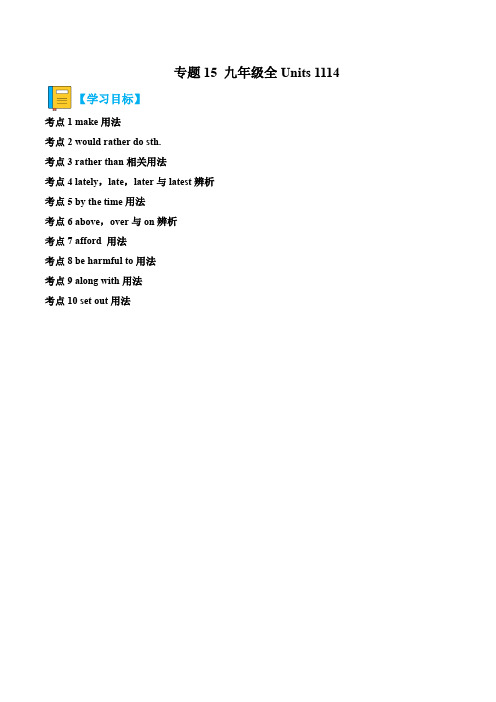英语:2013中考一轮复习 第一篇 教材考点梳理14(人教版)
2013版英语一轮精品复习学案:Unit1《Friendship》(新人教版必修1)

2013版英语一轮精品复习学案:Unit1 Friendship(新人教版必修1)【高考新动向】【考纲全景透析】【重点单词】1、upset adj。
心烦意乱的;不安的;不适的vt。
使不安;使心烦;弄翻;打翻;打乱,扰乱(计划等)①His strange behaviour upset his father.他的奇怪行为使他父亲很伤心。
②Don’t upset yourself about the exam.不要为考试烦恼。
③It upset him that nobody had bothered to tell him about it.让他不高兴的是,谁也没有把这件事告诉他。
④It upset me to think of her all alone in that in big house.想到孤身一人守着那所大房子,我感到很不舒服。
温馨提示:(1)upset为表语形容词,非定语形容词(2)upset的过去式和过去分词仍为upset(3)upset的现在分词为upsetting[来源:Z#xx#]即景活用:The protesters the meeting by shouting and throwing stones at the windows.[来源:学_科_网] A attending B held C upset D mixed【解析】选C。
句意为:抗议者们大喊大叫并不断向窗子扔石头打乱了会议。
Upset打乱;attend参加;hold 举办,容纳;mix混合2. calmcalm vt.& vi.(使)平静,(使)镇定;adj.平静的,镇静的。
calm down vi.平静下来calm sb down 使某人平静下来He took a few deep breaths to calm himself down他深深地吸了几口气,使自己平静下来。
The crying child soon calmed down哭闹的小孩不多一会就安静下来【拓展延伸】【点拨】:calm, quiet, silent, stillcalm 指气候、海洋“风平浪静的”,指人“从容镇静的”。
英语:2013中考一轮复习 第一篇 教材考点梳理11(人教版)-26页PPT资料

第11课时┃ 基础过关
ride
will be
will be
will
will happen
wear
won't
in
第11课时┃ 基础过关
have been skating Have been skating
to remember
sending me
第11课时┃ 重点突破
• 3 miss v.怀念,思念;错过;未赶上 • [点拨] miss的形容词形式为missing(丢失的; 失踪的)。 • I missed you very much while you were away. • 你不在的时候,我非常想念你。 • He missed a chance of success. • 他错过了一次成功的机会。
第11课时┃ 基础过关
fatter fattest
explanation collector/ collection
organization/ organizer Europe opportunity for certainly
第11课时┃ 基础过关
be interested in travel around the world make a lot of money make a living
第11课时┃ 重点突破
• 5 pair n.一双;一对 • [搭配] a pair of glasses一副眼镜 • two pairs of trousers两条裤子 • three clean pairs of socks三双干净的短袜 • [拓展] pair前面有时可用this,that,these,those等限定 词修饰。当a/ this/ that pair of…作主语时谓语动词用单数形 式。
英语:2013中考一轮复习 第一篇 教材考点梳理15(人教版)PPT资料23页

第15课时┃ 重点突破
• 巧辩异同 • 1 aloud, loud与loudly • (1)aloud是副词,意思是“大声地;高声 地”,它强调提高声音以便能听得到。 • (2)loud可作副词,强调声音的音量。loud 还可以作形容词,意思是“大声的;响亮 的”。 • (3)loudly是副词,含有“喧闹;令人生厌” 的意思。
第15课时┃ 重点突破
• 2 succeed v. 成功, 达到, 完成 • [点拨] succeed in doing sth意为“成功做成某事”。 • If you work hard you will succeed. • 如果你苦干, 就能够成功。 • He succeeded in getting top marks in chemistry. • 他拿到了化学课的最高分。 • [拓展] successful adj. 成功的; successfully adv.成功地; success n. 成功 • Failure is the mother of success. 失败是成功之母。 • She is a successful businesswoman. • 她是一位很成功的女企业家。
第15课时┃ 重点突破
• 5 offer v. 提供 • [搭配] offer sb sth 提供某人某物 • offer sth to sb 把某物提供给某人 • offer to do sth 主动提出做某事 • She offers to show us around. • 她主动给我们当导游。 • [拓展] give sb sth = give sth to sb 给某人某物 • pass sb sth = pass sth to sb 递给某人某物 • send sb sth = send sth to sb 寄给某人某物
中考英语复习方案第一篇教材考点梳理课时训练21U13_14九全试题

课时训练(二十一) Units 13-14(九全)(限时:30分钟)Ⅰ.用括号内所给单词的适当形式填空1.Mr. Dean was (thank) to the policeman who had helped his kids arrive safely.2.My brother is going to work in Guangzhou after his (graduate).3.I got great (inspire) from his speech on how to achieve your dream.4.My cousin took part in an (environment) project last summer as a volunteer.5.The new invention is not perfect. There're still a few (advantage).Ⅱ.单项选择6.『2019·武汉改编』—Why not ask Bob to join us in the trip to the zoo tomorrow?—Everyone in our group loves animals, but he always seems .A.carelessB.personalC.cruel7.『2019·长沙』Yesterday our headmaster made a speech environmental protection, and we learned something about recycling of waste.A.onB.atC.to8.You'd better the workers into two groups to do the work.A.divideB.changeC.make9.As students, we should ourselves. We can't spend much time playing computer games.A.be responsible forB.be proud ofC.be popular with10.It took me three weeks reading the novels written by Mo Yan.A.finishB.to finishC.finishes11.—Don't the waste paper. We can collect and recycle it.—You're right. Everyone should be a greener person.A.blow awayB.put awayC.throw away12.『2019·毕节改编』—How many letters you to your mother?—109 in all, since 2016.A.has; writtenB.have; writtenC.did; write13.—Could you tell me how to behave politely in public in the UK?—Yes. , you should keep your voice down and always queue.A.After allB.First of allC.In all14.—Steven had nothing for breakfast this morning, ?—No. Because he had a fever.A.had heB.didn't heC.did he15.『2019·河池改编』—We have won the first prize in the singing competition!—.A.CongratulationsB.Wait a momentC.Never mindⅢ.『2019·乐山改编』阅读选择When he was nine years old, American boy Milo Cress had a question: How many plastic straws(吸管) do Americans use every day?He quickly learned there wasn't a simple answer. The boy tried to work it out himself. Through lots of research, Cress found out that Americans use about 500 million straws every day. In the hope of reducing plastic waste, he founded the Be Straw Free project in 2011.Cress started the project in his hometown—Burlington, Vermont. He asked a local restaurant to stop offering straws with every drink order. It was a simple change. However, it would save money. And by doing that, the restaurant would cut down on its straw use by 50 percent.For the years that followed, Cress tried to spread his project across the United States. More and more restaurants agreed to join. They stop providing the customer with a straw unless he or she asks for one. Last April, Seattle became the first American city to completely ban(禁止) plastic straws.Plastic pollution has been one of the most serious problems today. According to scientists, more than eight million tons of plastic end up in the ocean each year. Plastic straws are especially terrible.They make it easy for people to get comfortable with single-use plastics.After his project became popular, Cress took his findings on the road. He has since spoken to tens of thousands of students around the world. He wants to encourage more people to say no to plastic straws.“Focusing(聚焦) on straws is one simple step we all could take,” Cress says. “And it makes me feel that I, as a kid, ▲, too.”16.When did Milo Cress start to care about the problem of straws? ( )A.Ten years ago.B.In the year 2011.C.In the year that he was 9.D.In the year 2017.17.Cress started the Be Straw Free project in order to . ( )A.get a good score in science at his schoolB.encourage people to reduce plastic wasteC.become a famous person in his hometownD.get lots of fun in his daily life18.What did Cress ask a restaurant in Burlington to do? ( )A.Stop offering straws to its customers.B.Prevent people from using straws to drink.C.Count the number of straws it uses every day.D.Prevent the cooks from using straws.19.Which can be the best for ▲? ( )A.am proud of meB.am a lively personC.could make a differenceD.could make progress20.Over the years, Cress has . ( )①spread his project across the United States②asked Seattle to completely ban plastic bags③counted the plastic straws in the ocean every year④spoken to teens around the world about plastic wasteA.①③B.②③C.①④D.③④Ⅳ.『2019·临沂改编』还原短文We have found plastic in the ocean and in animals like birds, fish and whales. But for the first time, scientists have found plastic in human poop(大便), USA Today reported. The findings came from a study led by scientists from Environment Agency Austria. 21. The volunteers wrote down what they ate for a week and then provided a stool sample(大便样本) for testing.22. About 20 small plastic particles(颗粒) were found in every 10 grams(克) of stool. “The smallest plastic particles can enter the blood, the lymphatic system, and may even reach the liver(肝脏),” said Philipp Schwabl, who took part in the research. 23. They're not sure how the plastic got in the volunteers' bodies, either. But most of the volunteers said they drank from plastic bottles and also ate seafood that could include plastic from ocean pollution.In fact, plastic is everywhere around us. Every year, lots of plastic waste goes into the ocean.24. Most of the particles stay in the ocean. Others can spread into the soil and air. Could plastic in the air fall onto food and get into the human body?Some past studies may also give us a clue. 25. And even some drinking water has been found to have tiny plastic particles in it.根据短文内容,将下面方框内的句子还原到文中空白处,使短文内容完整、通顺(每个选项只能用一次)。
英语:2013中考一轮复习 第一篇 教材考点梳理21(人教版)精品文档26页

第21课时┃ 重点突破
• 4 appear v.出现;露面;公开演出 • [点拨] appear的反义词为disappear。 • A bus appeared around the corner. • 一辆公共汽车出现在拐角处。 • [拓展] (1)appear可作连系动词,后接不定式作表语,意为 “看起来,好像”;当与“to be+adj./n.”连用时,to be往 往可以省略。 • He appears (to be)happy.他好像很开心。 • (2)appear之后也可跟从句,此时用于“It appears that/as if从句”这一句型中,意为“看来,似乎”。it是形式主语, 代替that从句。
第21课时┃ 重点突破
• 7 thanks to 幸亏;因为;由于 • [点拨] thanks to后接名词或名词短语。 • Thanks to In search of Roots,I am beginning to understand my Chinese roots and who I am. • 多亏“寻根”这个活动,我弄清了我的中 国根,也明白了我是谁。 • [拓展] because of 因为,由于
第21课时┃ 基础过关
thanks to look forward to
tell the truth work well lead to
the chance to do sth watch sb do/ doing sth
第21课时┃ 基础过关
makes tense learned from
so that one
第21课时┃ 重点突破
• 5 purpose n.目的;意图 • [搭配] on purpose 故意地 • for the purpose of 出于……目的,为 了…… • He went out for a walk without a purpose. • 他漫无目的地去散步。
人教版中考英语一轮复习:九年级英语Unit1-Unit 14 各单元重点语法知识点复习提纲(全面!)

人教版九年级全一册英语Unit 1 -Unit 14 各单元重点语法知识点复习提纲Unit 1 How can we become good learners?一、【精选单词】:ability n.能力;才能, attention注意;关注, brain大脑,conversation n. 交谈;谈话, expression n.表达(方式);表示, grammar n.语法,knowledge n.知识;学问, note n.笔记;记录, pronunciation n.发音;读音,secret n. 秘密;秘诀adj. 秘密的;保密的, speed n. 速度, textbook n. 教科书;课本,connect v.(使)连接;与⋯⋯有联系, create创造, discover v. 发现;发觉, increase v. 增加;增长,pronounce v.发音, repeat v.重复;重做, review v. & n. 回顾;复习,active adj. 活跃的;积极的, patient adj.有耐心的n.病人,二、【词组短语】1.become good learners .成为好的学习者2.work with friends .和朋友一块工作3.make word cards .做单词卡4.read the textbook .读课本5.listen to tapes .听磁带6.ask the teacher for help6.找老师帮忙7.study for a test .备考8.work with a groups.小组学习9.watch videos .看录像10.have conversations with sb.10.和某人交谈11.read aloud 大声读12.practce pronunciation12.练习发音13.learn a lot .学到许多14.improve my reading skills .提高我的阅读技能15.too hard to understand 太难理解16.spoken English英语口语17.a little nervous有点紧张18.finish reading读完19.give a report作报告20.get the main ideas理解大意21.word by word 逐词22.read word groups读词组23.guess a word's meaning猜词意24.be patient with sb.对...有耐心25.the more you read, the faster you'll be.你读的越多,你读的就越快26.find it difficult to learn 发现学习难27.the secret to language learning 语言学习的秘诀28.learn to do sth 学会做某事29.so……that如此……以至于30.most of the time 大部分时间31.be afraid to do 害怕32.because of my poor pronunciation因为我发音不好33.hide behind my textbook藏在我的课本后34.fall in love with 爱上35.begin to do 开始做36.body language.肢体语言37.expressions on their faces.面部表情38.listen for just the key words只留心听关键词39.as well as和...一样好/也40.something interesting一些有趣的东西eful sentences有用的句子42.a piece of cake小菜一碟/很容易的事情43.it serves you right.活该44.look them up查询他们45.so that以便46.have a better understanding of对...有一个更好的理解47.repeat out loud大声重复出来48.take notes记笔记49.do grammar exercises做语法练习50.keep a diary in English用英语记日记51.increase my reading speed提高我的阅读速度52.make mistakes in grammar/spelling在语法/拼写方面犯错53.get the pronunciation right把发音弄准确54.get much writing practice进行许多书写练习55.have a partner to practice English with找个一块练英语的伙伴56.a successful learner 一个成功的学习者57.be born with 与生俱来/天生具有58.the ability to learn 学习能力59.whether or not 不管还是60.depend on依靠61.learning habits学习习惯62.have ... in common 在...有共性63.creat an interest in sth.在.....创造兴趣64.be interested in感兴趣65.pay attention to关心,注意66.connect ...with把... 和...相连接67.get bored厌烦68.learn from mistakes从错误中学习.69.think about 考虑70.be good at擅长71.even if即使72.practice makes perfect熟能生巧73.keep practicing坚持练习74.develop their study skills培养他们的学习技巧75.it is not enough to do sth干……还不够76.write down写下77.draw mind maps画思维导图78.look for ways to do寻找做……的办法79.explain sth to sb.向某人解释……80.ask each other相互问81.find out the answers找到答案82.knowledge comes from questioning.知识来源于质疑83.a lifelong journey.一生的旅行84.learn wisely.智慧地学习?85.three good ways to .三个做……好办法86.be stressed out紧张的87.develop smart study skills.培养聪明的学习技巧88.on one's own.某人亲自89.bit by bit.一点一点的/逐渐地90.the last minute to do.做……的最后时刻91.at once.立刻,马上92.prepare well for sth准备好93.worry about.担心94.over and over again一次就一次地95.have a listening test.进行一次听力考试三、【重点句型】1. What about listening to tapes?听磁带怎么样?2. How do you study for a test?你怎样为考试而学习的?3. I study by making word cards.我通过制作单词卡片来学习。
中考英语一轮复习第一篇教材梳理篇第14课时课件

核心考点突破
❹ regret n. & v. 遗憾;抱歉;后悔 【题6】 用括号中所给词的适当形式填空 (1)I regret to tell you that you can't pass the examination.(tell) (2)I regret disturbing you so long.(disturb)
① 根据课堂提问抓住老师的思路。老师在讲课过程中往往会提出一些问题,有的要求回答,有的则是自问自答。一般来说,老师在课堂上提出的 问题都是学习中的关键,若能抓住老师提出的问题深入思考,就可以抓住老师的思路。
② 根据自己预习时理解过的逻辑结构抓住老师的思路。老师讲课在多数情况下是根据教材本身的知识结构展开的,若把自己预习时所理解过的知 识逻辑结构与老师的讲解过程进行比较,便可以抓住老师的思路。
核心考点突破
【归纳拓展】 1.(1)protect sb/sth (against/from sth)意为“保护、防护某人/某物(免于……)”,可用于被动结构。 如:His neck was protected by a scarf from the cold wind.他用一条围巾来保护脖子免受寒风吹。 (2)protect…from doing sth意为“保护……免于……”。如: Many stars try to protect their children from being known by the public. 很多明星尽力保护他们的孩子不被公众知道。 2.与其用法相似的有stop, prevent和keep,但是意义不同。stop/prevent sb (from) doing sth和 keep sb from doing sth均意为“阻止某人做某事”。如: The heavy rain kept us from arriving on time. 大雨阻止了我们准时到达。
英语:2013中考一轮复习 第一篇 教材考点梳理11(人教版)-26页PPT资料

第11课时┃ 重点突破
• 句型透视
• 1 If you go to the party, you'll have a great time!如果你 去参加聚会,你会玩得很开心! • [点拨] if表示“如果,假如”,引导一个条件状语从句。除 if外,还有unless(除非),as long as(只要)可以引导条件状语 从句。在对将来的事情进行假设时,主句可以是祈使句、一 般将来时或含有情态动词的句子,而从句则用一般现在时表 示将要发生的动作。 • Please call me if you come to Changsha. • 如果你到长沙来,请给我打电话。
第11课时┃ 重点突破
• 经典例题 • If he ________ enough time, he ________ the last bus. • A.have; will catch B.had; will catch • C.has; catch D.has; will catch • [答案] D
have to
run
out of
第11课时┃ 基础过关
anyone who
become famous
will
第11课时┃ 重点突破
重点突破
• 词汇点睛 • 1 chance n.机会;机遇 • This is a great chance that many people do not have. • 这是许多人都没有的大好机会。 • [搭配] by chance=by accident恰巧;偶然 • take one's chance 碰运气;听天由命 • I never miss a chance of playing football. • 我从不错过踢足球的机会。
2013年英语北京中考复习方案---第一篇教材考点梳理

第1课时┃词语辨析
词语辨析
1 care about与 care for [辨析] care about和care for都有“关心、照料”的
意思,二者的区别是care about还指“介意、在乎”, care for指“喜欢、想要”。 The man whom you care for never cares about what people say. 你喜欢的那个人从来不在乎别人说什么。
第1课时┃ 考点精选
7
above all 首先,首要 What a child should do, above all, is to do well in his studies. 小孩子该做的最重要的事是学好功课。 8 according to 根据,按照 According to our records, the books you have borrowed should now be returned to the library. 根据我们的记录,你借的书现在应该还给图书馆了。
第1课时┃考点精选
4
begin [点拨] v.开始;着手 [拓展] begin doing/to do sth. 意为“开始做某事”。 After breakfast it began to snow. 早饭后开始下起雪来。 I began my business at the age of 16. 我16岁开始了自己的事业。 [拓展] 常见搭配:begin with意为“以„„开始”。
第1课时┃句型聚焦
I will tell him the news as soon as he comes back. 他一回来我就告诉他这个消息。(主将从现)
I'll give you a reply as soon as I get your email. 我一收到邮件,就给你回复。 Li Ping begins to do his homework as soon as he comes back home. 李平一回到家就开始做作业。
第十四关:一般将来时态-【中考英语一轮复习语法一遍过】 (人教版)

一般将来时(一)含义:将来要发生的动作或事情。
(二)动词形式:will+动词原形/be going to+动词原形/be about to do(三)关键词:in the future(将来);tomorrow(明天);next week/month/year....(下...);at once(马上);具体语境......例句:We will have dinner at the new restaurant near our school tonight.今晚我们将在学校附近的新餐馆吃饭。
例句:I am sure there will be more trees in our country in the future.我相信我们国家将来会有更多的树。
(四)现在进行时表将来时下列动词的现在进行时表示将来时:go,come,fly,leave,start,begin,finish,end,arrive等。
例句:she is leaving for Wuhan tomorrow.(五)一般现在时表将来1、下列动词come,go,arrive,leave,start,begin,return的一般现在时可以表示将来,主要用来表示在时间上已确定或安排好的事情。
例句:The train leaves at six tomorrow morning. 火车明天上午六点开。
例句:When does the bus star? It stars in ten minutes. 汽车什么时候开?十分钟后。
2、以here,there等开始的倒装句,表示动作正在进行。
Here comes the bus. = The bus is coming. 车来了。
There goes the bell. = The bell is ringing. 铃响了。
3、在时间或条件句中。
When Bill comes(不是will come), ask him to wait for me. 比尔来后,让他等我。
专题15Units11-14-2023年中考英语一轮复习教材完美梳理(人教版)

专题15 九年级全Units 1114【学习目标】考点1 make用法考点2 would rather do sth.考点3 rather than相关用法考点4 lately,late,later与latest辨析考点5 by the time用法考点6 above,over与on辨析考点7 afford 用法考点8 be harmful to用法考点9 along with用法考点10 set out用法【考点聚焦】考点1 make用法(九年级Unit11 P81)Sad movies make me cry.悲伤的电影让我哭泣。
【点拨】make 意为“使得;使变得;使成为”时,常见用法如下:(1)make sb./sth.+形容词使某人或某物……The news made him happy.这个消息使他很高兴。
(2)make sb./sth.+名词使某人/某物成为……Do you think we can make our school a green school?你认为我们能使学校成为绿色学校吗?(3)make sb. do sth. 使某人做某事Nothing will make me change my mind.什么也改变不了我的主意。
(4)make+反身代词+过去分词使……被……She couldn’t make herself heard above the noise of the traffic.车辆噪音很大,她无法让人听到她的声音。
(5)make it+时间把时间约定在……Let’s make it 9 a.m.让我们把时间约定在上午九点吧。
注:(1)make sb.do sth.变为被动语态时要加不定式符号to,即sb.be made to do sth.。
(2)“make it+形容词/名词+不定式/从句”结构中,it 作形式宾语,不定式/从句是真正的宾语。
学以致用1.(2023·山东青岛·统考一模)Why don’t we meet a little earlier? Let’s make ________ at 1:30.A.that B.this C.one D.it【答案】D【详解】句意:我们为什么不早点见面呢?让我们约定在1点30分。
最新人教版中考英语一轮复习 Units11-14 基础复习 (共15张PPT)教育课件

五朵“金花”:spend; take; pay; cost; buy
1. spend…on sth./(in) doing sth./with sb. 花钱,花时间 2. take: It takes sb. …to do sth.花时间 3. pay some money for sth.花钱,付款; 4. cost: sth./Doing sth. cost sb…花钱;花时间 5. buy sth. for some money:花钱; 另外:afford to do sth.负担得起 注意:花费句型多以“人”做主语,但cost用“物”作主语;take必须用 it作主语。
小试牛刀:不服来战
1. Have you _j_o_in_e_d___ the army? 2. Come and ___jo_i_n__ us _in___ the discussion.
3. My uncle __to_o_k_p_a_r_t_in___ the sports meeting last spring. 4. Look! They are dancing. Go to ____j_o_in__ them, please. 5. I want to _j_o_in____ the students _in__p_la_y_in_g______(play) basketball, OK? 6. Tomorrow we will go to __a_tt_en_d__ an important meeting.
1. 制造:make sb. sth.=make sth. for sb.
His father made him a toy car.
be made of___________; be made from________; be made out
- 1、下载文档前请自行甄别文档内容的完整性,平台不提供额外的编辑、内容补充、找答案等附加服务。
- 2、"仅部分预览"的文档,不可在线预览部分如存在完整性等问题,可反馈申请退款(可完整预览的文档不适用该条件!)。
- 3、如文档侵犯您的权益,请联系客服反馈,我们会尽快为您处理(人工客服工作时间:9:00-18:30)。
短语 归纳
第14课时┃ 基础过关
类别
课标考点要求
短语 归纳
be afraid to do sth 4.害怕去做某事;不敢去做某事_________________________ laugh at(sb) 5.嘲笑;取笑_________________________ take notes 6.做笔记;做记录_________________________ look up 7.查阅;查找_________________________ make up 8.编造;组成;拼凑成_________________________ deal with 9.处理;应付_________________________ 10.生某人的气;对某人感到气愤 be angry with sb go _________________________ by try one's best to do 11.(指时间)过去;消逝_________________________ break off 12.尽力做_________________________ 13.突然中止;中断_________________________
句型 再现
语法 结构
第14课时┃ 重点突破
重点突破
• 词汇点睛 • 1 unless conj. 如果不;除非 • [点拨] (1)引导条件状语从句,常与if…not互换,但在表示 与某个客观事实相反的虚拟语气中,只能用if… not,不能 用unless。 • She would have died if the doctors had not saved her. • 如果医生不救她的话,她就死了。(不能用unless) • (2)unless 和 if引导的条件状语从句和时间状语从句一样, 若主句为一般将来时,从句用一般现在时代替将来时。
第14课时┃ 基础过关
类别
课标考点要求
重点 单词
aloud 11.____________ cause 12.____________ 13.____________ mistake daily 14.____________ 15.____________ death patient 16.____________ unless 17.____________ complete 18.____________ face 19.____________ waste 20.____________
第14课时 Units 1—2,Book 9
第14课时┃ 基础过关
基础过关
类别 课标考点要求
重点 单词
pronunciation 1.__________________ n.发音;发音法 quickly 2.____________ adv.快地;迅速地 realize 3.____________ v.认识到;了解到 matter 4.____________ n.重要;要紧;有关系 impress 5.____________ v.给„„深刻印象 trouble 6.____________ n.困难;苦恼;忧虑 7.____________ n.挑战 challenge 8.____________ adj.害怕的 afraid duty 9.____________ n.责任,义务 influence 10.____________ v.影响
第14课时┃ 重点突破
• 经典例题 • I won't take part in Julie's birthday party ________ I am invited. • A.unless B.after C.because D.if • [答案] A
第14课时┃ 重点突破
• 2 patient adj.忍耐的,有耐心的 • [点拨] patient的反义词是impatient。其常用 搭配: • be patient with sb/ sth 对某人/某事有耐心 • be patient at sth 对某事有耐心
第14课时┃ 基础过关
类别
课标考点要求
短语 归纳
used to 14.过去经常;以前常常______________ be terrified of 15.非常害怕的;极度恐惧的______________ go to sleep 16.入睡______________ in the end 17.最后;终于______________ make a decision 18.做决定;下决心__________________ to one's surprise 19.令人惊奇的是__________________ even though 20.即使;纵然;尽管__________________ take pride in/ be proud of 21.对„„感到自豪____________________________________ pay attention to 22.对„„注意;留心__________________ give up 23.放弃__________________
第14课时┃ 重点突破
• 4 pride n.得意;自豪 • [点拨] pride的形容词形式为proud(自豪的), 常用搭配: • take pride in = be proud of 对……感到自 豪/骄傲 • They were proud of their success. • =They took pride in their success. • 他们对他们的成功感到骄傲。
第14课时┃ 重点突破
• 5 afraid adj.害怕的 • [搭配] be afraid to do sth 害怕做某事 • be afraid of sb/ sth/ doing sth • =be terrified of …害怕某人/某事/做某事 • The old man was afraid to cross the street alone. • 那位老人害怕一个人过马路。 • She is afraid of her father.她怕她父亲。 • She was afraid of waking her husband up, for he was ill. 她唯恐吵醒她的丈夫,因为他生病了。 • Don't be terrified/ afraid of the dark. 不要害怕黑暗。
第14课时┃ 基础过关
类别
课标考点要求
句型 再现
1.“你怎样学习英语?” “我通过学习小组学习英语。” —How do you learn English? studying —I learn by ______________ with a group. 2.我以前讨厌体育课。 used to I ______________ ______________ hate gym class. 3.“你曾经利用小组学习过吗?” “是的。我用那种方法学到了很多。” with a group —Have you ever studied________ ________ ________? that way —Yes,I have.I've learned a lot ________ ________.
第14课时┃ 重点突破
• 经典例题 • Don't be __________ with her.She is only a child. • 不要对她没有耐心,她只是一个孩子。 • [答案] impatient
第14课时┃ 重点突破
• 3 death n.死;死亡 • [拓展] die v.死,死亡;dead adj.死亡的;dying adj.要死 的 • 经典例题 • —What happened? • —The old man next door was found________in the living room. It's very sad. • A. dead B. die C. dying D. death • [答案] A
第14课时┃ 基础过关
类别
课标考点要求 4.我过去常常花大量的时间和我的朋友们一块玩游戏。 spend playing I used to ________ a lot of time ________ games with my friends. 5.班主任说,马丁有必要同他的母亲谈一谈。 it necessary The head teacher said ______was ______________for Martin to talk with ______ ______ his mother. 学会如何表达过去经常做某事。
第14课时┃ 重点突破
• 巧辩异同
•
cost, take, spend与pay • (1)cost意思是“花费(金钱)”,主语一般是物。 • (2)take意思是“花费(时间或金钱)”,主语一般为物,常 用it作形式主语。 • (3)spend意思是“花费(时间或金钱)”。主语一般为人, 常和介词on/ in搭配。spend some time/some money on sth 花费多长时间或多少金钱在某物(事)上;spend some time/ some money (in) doing sth 花费多长时间或多少金钱 做某事。 • (4)pay意思是“花费(金钱)”,主语一般为人,常和介词 for搭配。
第14课时┃ 重点突破
• 6 give up放弃 • [点拨] give up后接名词、代词或动名词作宾语。若宾语为 代词时,要用宾格且放在两词中间。 • He gave up smoking last year. 去年他戒了烟。 • [拓展] 后接动名词的动词短语: • look forward to doing sth渴望做某事 • be used to doing sth习惯于做某事 • feel like doing sth想做某事 • cannot help doing sth忍不住做某事 • put off doing sth推迟做某事
